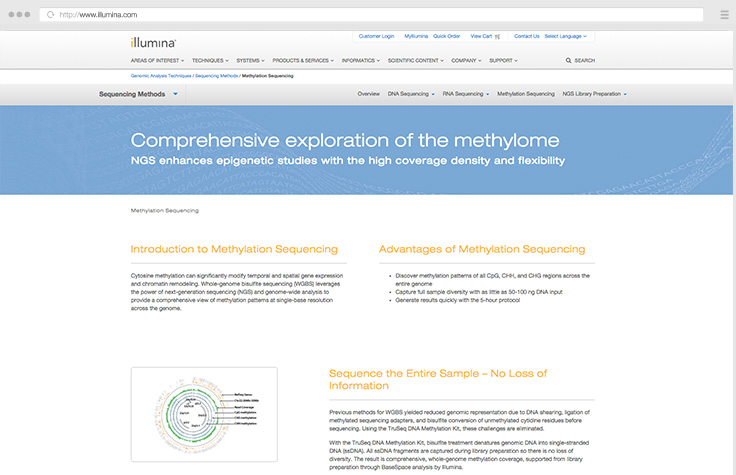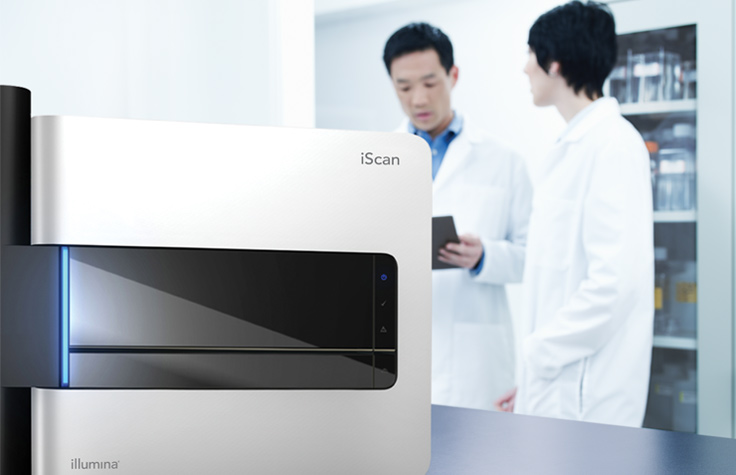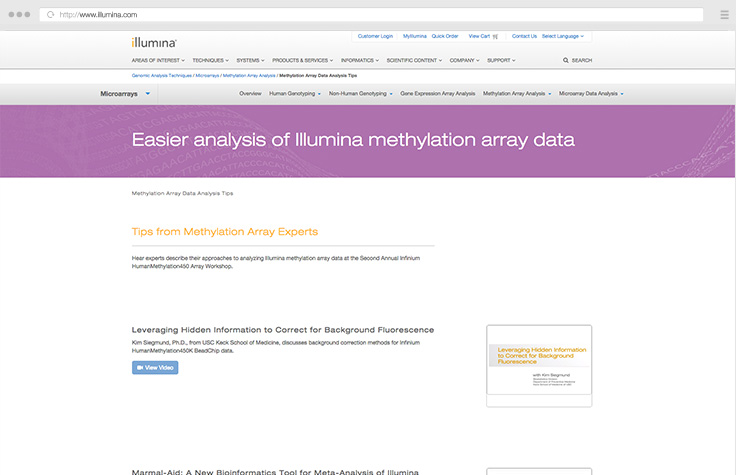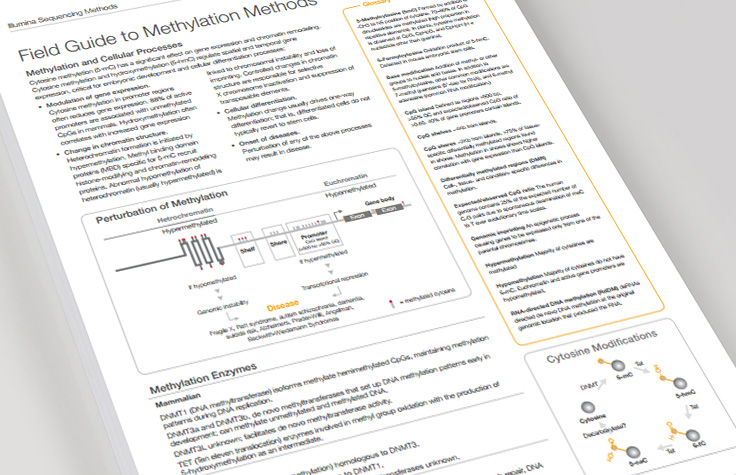メチル化アレイ解析
メチル化アレイ解析の概要
メチル化アレイは、ゲノム全体にわたる選択されたメチル化サイトの定量的精査を可能にし、サンプルあたりのコストを最小限に抑えるハイスループット機能を提供します。アレイベースのメチル化研究は、遺伝子発現の制御に関する貴重な洞察を提供することができます。DNAメチル化は、細胞のウイルスおよび非宿主DNAエレメントの発現を抑制し、環境刺激との反応を促進します。異常なDNAメチル化(過剰メチル化または低メチル化)とその遺伝子発現への影響は、多くの生物学的プロセスや疾患に関与しています。
イルミナメチル化アレイ
Infinium Methylation Assayでは、1塩基の解像度でCpG部位を精査することができ、非常にロバストなDNAメチル化の測定値が得られます。キュレーションされたゲノムワイドアレイから1つ選択するか、ターゲットアプリケーション向けに独自のマイクロアレイを設計してください。
MethylationEPIC v2.0
Infinium MethylationEPIC v2.0 BeadChipは、ゲノムワイドなメチル化解析ツールであり、その機能コンテンツは強化され、専門家により選択されています。遺伝性疾患や希少疾患の研究、がん研究、分類に最適です。
Infinium Methylation Screening Array
Infinium Methylation Screening Arrayは、集団健康研究のための費用対効果が高くスケーラブルなソリューションで、バイオバンクスクリーニングやエピゲノム全体の関連研究に理想的で、約27万のメチル化サイトと大規模コホート向けの自動化を備えています。
Mouse Methylation BeadChip
Infinium Mouse Methylation BeadChipは、マウス系統全体のゲノムワイドな高分解能DNAメチル化解析を提供し、単一ヌクレオチドの分解能で285Kの部位をカバーします。EWAS、異種移植研究、および前臨床研究に最適で、PCRフリーのワークフローで包括的なカバレッジと再現性を提供します。
HTS iSelect Methyl Custom BeadChip
Infinium Custom Methylation Kitは、ターゲットエピジェネティック研究用の柔軟なオーダーメイドアレイを提供し、3K~100Kマーカーとハイスループット処理をサポートします。特殊なプロジェクトに最適で、堅牢なInfiniumケミストリーと自動化対応ワークフローを組み合わせ、正確でスケーラブルなメチル化解析を実現します。
Custom EX Methyl Beadchip
これらのBeadChipは、ヒトまたは一部の非ヒトサンプルにおけるユーザー定義のメチル化部位の大規模な研究スクリーニングを行う必要のあるお客様に最適なソリューションです。

ヒト疾患研究のためのDNAメチル化
このeBookでは、DNAメチル化と、ヒトの疾患やその他の表現型の研究でのアプリケーションについて紹介します。また、試験デザイン、サンプルの種類、データ解析に関する考慮事項など、エピゲノムワイド関連解析についても取り上げます。
eBookをダウンロードメチル化アレイワークフロー
当社のメチル化アレイは、合理化されたワークフローに従っており、わずかなサンプルインプット(わずか250 ng)から同時に最大96のサンプルの処理が可能です。
これらのメチル化マイクロアレイは、単一CpG部位レベルでの定量的測定を提供し、エピジェネティックな変化を理解するための強力な解像度を提供します。
以下のをクリックしてワークフローの各ステップで使用する製品をご覧ください。
CpGアイランド、遺伝子、エンハンサーの広範なカバレッジとFFPE互換性を備えたロバストなメチル化プロファイルマイクロアレイ。
集団健康研究用に最適化された超スケーラブルなメチル化アレイ。1,000を超えるサンプル、最大数百万のサンプルの研究に最適です。
多様なマウス系統の高分解能エピジェネティック解析用にメチローム全体で285Kを超えるマーカーを表示します。
お客様の特定のニーズに合わせてオーダーメイドのハイスループットアッセイを作成します。このアレイはその柔軟性と特徴により、幅広いエピジェネティックなアプリケーションのための強力なツールとなります。
ハイスループットのBeadChip処理をサポートし、数百から数千に及ぶサンプルを迅速かつ正確にスキャンします。
ワークフローを効率化しエラーを低減する、Infinium、GoldenGate、およびDASLアッセイ用のジェノタイピング自動化オプションです。Illumina Robot Control Softwareを使用し、リキッドハンドリングを自動化することで、サンプル調製をiScanシステムのワークフローへシームレスに自動化することができます。
Infiniumメチル化マイクロアレイのクラウドベースのハイスループットと定量レポート作成。
Infiniumコントロールを視覚化して、高品質の処理を確保し、DNAメチル化ビーズチップデータの基礎解析を実行します。
関連ソリューション
複雑な疾患研究
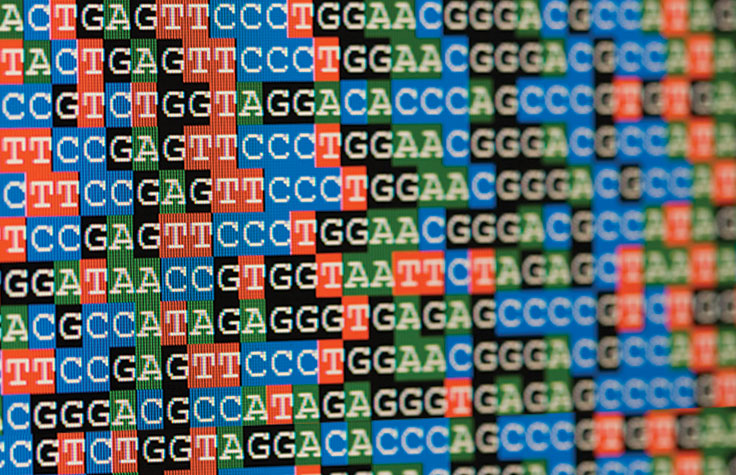
メチル化アレイの研究により、研究者は複雑な疾患で作用する機能メカニズムを理解することができます。イルミナは、これらの疾患を研究する研究者に補完的なソリューションを提供します。複雑な疾患研究の詳細はこちら。
エピジェネティクスとがん

イルミナのアレイおよびシーケンスソリューションは、腫瘍形成パスウェイやがんの進行についての洞察を提供する、メチル化パターンの変化やエピジェネティックな変化の検出に最適です。がんエピジェネティクスの詳細はこちら。



